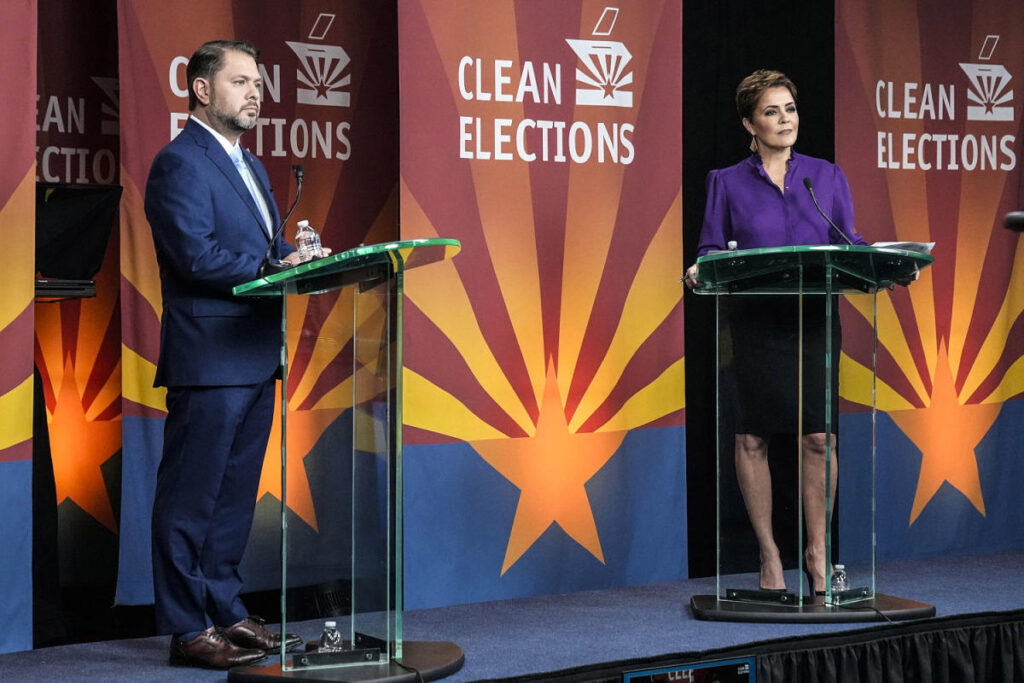In Arizona’s dynamic political landscape, Mesa Mayor John Giles highlights the intriguing disconnect between the state’s presidential race and the competitive down-ballot elections. While polls indicate that Republican Senate candidate Kari Lake is losing significant support among former President Donald Trump’s base to her Democratic opponent, Rep. Ruben Gallego, Giles expresses bewilderment at this phenomenon. He notes that Lake echoes Trump’s rhetoric yet fails to resonate similarly with voters, pointing to a unique environment in Arizona where key races for Senate and the House are influenced more by individual candidate characteristics and voter preferences rather than the overarching presidential contest. The current political climate, marked by a ballot measure aimed at establishing abortion rights in the state constitution, has also not produced the momentum for Democratic candidates that they anticipated.
As the battleground state emerges as a focal point in the national political landscape, two critical House races are drawing attention. Veteran Republican Rep. David Schweikert and freshman Republican Rep. Juan Ciscomani face tough challenges from Democratic challengers amid shifting voter demographics and party coalitions. Both races are characterized by narrow margins: Schweikert won his last election by less than one point, and Ciscomani’s victory was similarly slim. Analysts foresee that the outcomes will hinge more on the distinct profiles of the candidates rather than on the presidential or Senate races taking place concurrently. Ideological divides are evident, with Democrats emphasizing reproductive rights and healthcare, while Republicans focus on economic concerns, border security, and crime.
The competitiveness of these House races is reaffirmed by their “toss-up” rating from the Cook Political Report, indicative of an unpredictable electoral landscape. Candidates recognize that their prospects are tied to their personal appeal, with Democrats asserting that Gallego’s strength does not automatically bolster their chances, and Republicans maintaining that Lake’s struggles haven’t translated into definitive disadvantages for their campaigns. In evaluating voter behavior, party operatives from both sides agree that Arizonans have developed a reputation for sophisticated ticket-splitting, capable of casting votes that do not align strictly with party loyalty.
Despite these complexities, demographic shifts present new challenges for Republicans, particularly as Democrats are drawing support from white college graduates in suburban areas. This trend poses a risk to incumbent Republicans like Schweikert and Ciscomani, who have previously secured victory despite broader Republican losses in their districts. Conversely, Democrats face potential losses among Latino voters, especially among men without college degrees. Gallego’s identity as a Latino veteran is suggested to facilitate connections with these voters, positioning him favorably compared to Kamala Harris in their shared pursuit of the presidency.
Individual electoral dynamics reveal that specific issues may play lesser roles in determining outcomes. Republican candidates prioritize crime, inflation, and border security as key talking points, while Democrats leverage their perceived successes in healthcare and social security matters. A survey illuminated that far-right Rep. Eli Crane, despite being in a traditionally Republican area, is underperforming compared to Trump, indicating that some rural voters may exhibit a propensity for ticket splitting. This trend hints at a more complex voting behavior among constituents who are reevaluating their party loyalties based on candidate actions and endorsements.
Adding intrigue to the situation, Crane’s inability to replicate Trump’s support has been attributed to his controversial decision to align with a faction of Republicans that ousted former Speaker Kevin McCarthy. This action appears to have alienated some of his base, and the challenge from Jonathan Nez, a former president of the Navajo Nation, suggests an opportunity for Democratic engagement with Native American communities in Arizona. Ultimately, as the state prepares for its consequential election season, the various layers of political strategy, candidate personalities, and changing voter demographics weave a narrative that underscores Arizona’s uncertain electoral landscape, further emphasizing the need for candidates to cultivate individual connections with their constituents.

